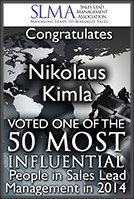A Replacement for War? Part 2
As I covered in my last blog post, we as businesspeople actually hold the very seeds of world peace right in our hands. Trade can only be conducted by nations not at war, and our most powerful weapons are our ideas.
Now just how powerful is the idea, and what is the only way it can truly and effectively come about?
Enforcement
There have been some throughout history that realized how important ideas were, but decided that the best way to get ideas broadly accepted would be through conquest and enforcement. Let’s first examine how effective those tactics were.
Probably the most obvious example in recent history is that of Adolf Hitler, who with his military might attempted to implant his ideas of a master race and genocide. While for a short time it seemed as if he would bring these concepts to fruition, in the end he fell mightily and today those ideas have been soundly rejected as absurd by the vast majority.
Going back further to 1861, a select but powerful few, in the Southern United States, decided they were going to retain their idea of a slave-based economy despite a government that was clearly leaning toward the abolishment of slavery. They attempted through military revolt to establish their own country—the Confederate States of America—through which to maintain their “ideals.” The result was the American Civil War, the bloodiest conflict in history up to that point. It ended in complete defeat and economic disaster for the South, disaster from which it took decades to recover. And the actually constructive idea had by President Abraham Lincoln—the abolition of slavery—indeed came to pass.
In 1917, through revolution and government takeover, communism was established as the state ideology in Russia. Through military and secret police intimidation, it was maintained for nearly 75 years—but in the end that wall came down and classical communism lost a huge percentage of its world territory. The other communist stronghold, China, remained—but today it is slowly but surely turning to capitalism for its economic survival.
Today terrorists attempt to enforce their various twisted ideologies through horrific acts. But how successful has that been? It has only caused further hatred for the terrorists—those ideas are no closer to being adopted than they were before it all began.

The True Power of the Idea
Now let us examine a few good ideas that were spread through peace and free will, and see how powerful they actually are.
Somewhere between 600 and 400 B.C., Gautama Buddha planted ideas of spiritual existence that, through time, became the foundation for what is today the world’s largest religion, Buddhism. The core idea that remains with us today is that a higher existence that can be achieved by humankind as spirits, and that ultimately the material things of the world must be rejected as they play no part in immortality.
Most of us know of Jesus of Nazareth. The ideas that he spread in his short lifetime some 2,000 years ago are still quite alive and taught every day, throughout the world. One main idea from his teachings, very much still with us, is that of compassion—“treating your neighbor as yourself”—and the practice of compassion for all people.
In more modern times we have seen further dynamic examples of the constructive idea. In the 1930s and 1940s Mahatma Gandhi led India to independence from British rule without a single shot fired, through his philosophy of non-violent resistance. One idea he put forth during his lifetime was that of the identity of India; he taught that Indians had their own identity as a spiritual people, and could not identify themselves as a nation by adoption of British national traits such as militarism.
Gandhi set a pattern that others would follow, most notably American Reverend Martin Luther King, who in the 1960s achieved civil rights for African Americans. He achieved this goal much like Gandhi achieved his: He showed African-Americans that they had a distinctive identity of which they should be proud, and that non-violent resistance—not the brutal methods used by their oppressors—would be the path to their freedom.
What Constitutes a Good Idea?
The founding fathers of the Austrian School of Economics have given us a very practical definition of what constitutes a good idea, versus a bad idea.
First of all a good idea is one on which one can reflect, and find ways in which that idea can apply to one’s existence, economic survival, business or other sphere. It has an instinctive ring of truth with an individual or a group, and has applicability.
Secondly, a good idea is healing in nature. It is a true solution to a problem or set of problems. For example, the idea of individual freedoms granted through the independence of the original American 13 colonies acted as a healing agent for the suffering that had occurred under English rule. Another more everyday example would be a new marketing strategy in a company that throws the doors wide open to the promotion of that company’s product—it would heal the company’s frustration at not being able to reach its intended prospects.
Third, an good idea is unifying. It tends to unite forces previously opposed, and provide a common path toward an ideal goal. A free-market economy is such an idea, one that provides anyone a path toward prosperity, regardless of class. Note that most ideas put forth by modern politicians do not have this quality—they divide people across party lines.
What of Commerce?
More pertinent to our subject, what kinds of constructive, powerful ideas have we seen spread through commerce? Did these ideas contain the three qualities mentioned above? As you’ll see, they certainly did.
Today we take totally for granted the personal computer. But this began as an idea, originally developed and marketed by Italian company Olivetti all the way back in the mid-1960s. It took two decades for the idea to become practical and make it through to the general public—but today personal computing devices are so commonplace that the average teenager, if asked what the world must have been like without them, would return a dumbfounded stare. “How would I do my homework?”
When you plug in that personal computing device or smartphone to charge it, you might not know that the electricity coming through that outlet was a major achievement. It was the idea of Serbian inventor Nikola Tesla in the mid- to late-1800s that brought about alternating current—the system that makes it possible for high voltage to be carried through lines over long distances.
When you drive to work in your affordable car, you should know that that, too, began very much as an idea. Back at the beginning of the 20th century motor vehicles were prohibitively expensive, only driven by the well-do-do. Everyone else rode horses or drove horse-drawn wagons or carriages. But Henry Ford had the idea of an affordable car for everyone—and the car he built in 1908, the Model T, made it possible for virtually everyone to own one, an idea certainly still very much with us.
Today there are ideas taking hold that will eventually save our planet from ecological and economic ruin. Alternative energy, solar and wind power, will ultimately replace the destructive pillaging of our dwindling oil supply. Sustainable farming practices are becoming widely adopted, that not only do not harm the land and ecology, but actually benefit them and provide more nutritious food besides. Localized economies—much more sustainable than the global economy which has never been truly stable—are becoming established in an ever-increasing number of places throughout the world.
Each one of these examples contain all three of the characteristics of a good idea. It is possible to reflect on them and clearly see where they take us. They are healing of a lack or a problem on a broad scale. And they unify us in our forward progress.
So you can see that you, as an employee, salesperson or entrepreneur, are armed with a weapon far more powerful and long-lasting than a rifle, a cannon or a bomb. With good ideas formed and utilized in commerce, you can help bring about a peaceful planet engaged only in trade, not war.
So let’s do this!








Leave a Reply
Want to join the discussion?Feel free to contribute!